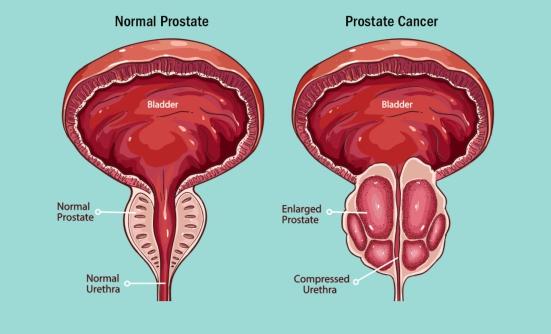President Biden’s Prostate Cancer Diagnosis: A Catalyst for Awareness and Support
Recently, the revelation of President Joe Biden’s prostate cancer diagnosis has highlighted the personal ramifications of this widespread illness, thrusting it into the national spotlight. With nearly one in eight men facing a similar fate, the consequences reach far beyond politics. For countless individuals confronting their own health uncertainties, Biden’s experience serves as a powerful reminder of the hurdles associated with prostate cancer treatment and care. As society reflects on his journey, it is vital to explore what this diagnosis signifies for the larger patient community—particularly regarding medical progress, psychological impacts, and the critical nature of early detection and support systems. This article examines the implications of Biden’s diagnosis while illuminating the realities faced by millions and offering insights from a public figure navigating these challenging waters.
The Influence of Prominent Diagnoses on Prostate Cancer Awareness
High-profile health diagnoses often create significant ripples that extend well beyond individual circumstances. When a notable figure like President Biden is diagnosed with prostate cancer, it can lead to substantial increases in public awareness about this condition. Such announcements can spark conversations around prostate health that encourage more men to seek screenings and understand their risk factors better. This increased visibility helps dispel myths surrounding prostate cancer while motivating individuals—especially men—to take proactive measures regarding their health. As awareness rises, so does the likelihood of earlier diagnoses which are crucial for effective treatment.
The media attention surrounding cases like Biden’s plays an essential role in shaping societal perceptions and influencing policy discussions related to prostate cancer. It underscores an ongoing need for sustained funding towards research initiatives as well as access to various treatment options. Advocacy organizations leverage personal stories alongside statistics that resonate with everyday people; thus fostering empathy and support for patients battling this disease or those who have survived it. Here are some potential outcomes stemming from such high-profile cases:
- Boosted Screening Participation: More men may feel encouraged to discuss screening options.
- Acknowledgment of Risk Factors: Increased understanding regarding family history or genetic risks.
- Pursuit of Research Funding: Heightened focus on securing necessary funds for innovative therapies.
| Outcome | Illustrations |
|---|---|
| Amped-Up Public Awareness | Sustained media coverage leading to discussions about men’s health issues. |
| Civic Engagement | The emergence of local events aimed at promoting awareness and education about health matters. |
Exploring Treatment Options and Support Networks Following a Prostate Cancer Diagnosis
Navigating through available treatment avenues after receiving a prostate cancer diagnosis can be overwhelming for both patients and their families alike. The array includes diverse strategies tailored according to factors such as cancer stage, overall patient wellness, along with personal preferences concerning care approaches. Commonly presented treatment modalities include:
- Active Monitoring: Keeping close tabs on tumor progression without immediate intervention.
- Surgical Procedures: Operations like radical prostatectomy aimed at removing affected tissues including parts surrounding them.
- X-ray Therapy: Employing high-energy radiation waves targeting malignant cells directly.
- Chemotherapy Treatments:This involves administering drugs designed specifically against rapidly dividing cells during advanced stages.
- This method focuses on lowering or inhibiting hormones that promote tumor growth.
- Utilizing treatments that enhance immune response against tumors.
Apart from clinical interventions themselves , establishing robust support networks proves invaluable when addressing emotional challenges accompanying any formofcancerdiagnosis . Patients should actively seek out both formalizedand informal channelsfor assistance , including : p >
- < Strong >Support Groups :< / strong > Participatingin groups dedicatedto sharing experiences relatedto prostatediseasecan foster connectionsand provide valuable insights .< / li >
- < Strong >Therapeutic Counseling :< / strong > Engagingwith professionalscan help manageanxietywhile improvingemotional resilience .< / li >
- < Strong >Family & Friends :< / strong > Relyingon loved onesfor encouragementand practical aidis crucialduringthis time .< / li >
- < Strong >Advocacy Organizations :< / strong > Groupslike TheProstateCancerFoundationoffer resourcesalongsidecommunitysupport.< / li >
ul >Support Network th > Advantages th >
tr >Support Groups td > Shared experiencesleadingto emotional relief. td >&
/ tr >Therapeutic Counseling td >& Expert guidanceon coping mechanisms.&nbps;</ td > ;
/ tr > Final ThoughtsAs America contemplates President Biden’s recent battle withprostatacancer,it servesas an important reminderofongoingstrugglesagainstthis prevalentcondition.For thosereceiving similarnews,the president’s journey illuminatesbothmedical complexitiesandemotional challenges inherentin suchdiagnoses.As advancementsin treatmentscontinueprogressing,thepersonalstoriesofresilience remain paramount.Public figureslikeBiden shine lightsonprostatacancersupportivecommunitiesencouragingopen dialoguesamongthoseaffected.Looking forward,it remainscrucialforpatientsstay informedwhileengagingactivelywiththeirhealthcareprovidersensuringtheyarewell-equippednavigatetheirjourneys confidently.The fightagainstprostaticcancercallsforcollectiveeffortswhereeachdiagnosisservesas impetusresearchadvocacyultimatelyleadingbetteroutcomesforall.
- Utilizing treatments that enhance immune response against tumors.
